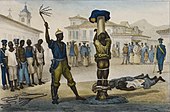| Ingraham v. Wright | |
|---|---|
 | |
| Argued November 2–3, 1976 Decided April 19, 1977 | |
| Full case name | Ingraham, et al., v. Wright, et al. |
| Citations | 430 U.S. 651 (more) 97 S. Ct. 1401; 51 L. Ed. 2d 711 |
| Argument | Oral argument |
| Reargument | Reargument |
| Opinion announcement | Opinion announcement |
| Holding | |
| The cruel and unusual punishment clause of the Eighth Amendment did not apply to corporal punishment as a disciplinary practice in public schools, and the due process clause of the Fourteenth Amendment did not require notice or a hearing prior to imposition of such punishment, as the state's laws authorized the practice and allowed common law constraints and remedies. The primary purpose of the Cruel and Unusual Punishments Clause has always been considered, and properly so, to be directed at the method or kind of punishment imposed for the violation of criminal statutes. When public school teachers or administrators impose disciplinary corporal punishment, the Eight Amendment is inapplicable (lexisnexis) | |
| Court membership | |
| |
| Case opinions | |
| Majority | Powell, joined by Burger, Stewart, Blackmun, Rehnquist |
| Dissent | White, joined by Brennan, Marshall, Stevens |
| Dissent | Stevens |
| Laws applied | |
| U.S. Const. amends. VIII, XIV | |
| Part of a series on |
| Corporal punishment |
|---|
 |
| By place |
| By implementation |
| By country |
| Court cases |
| Politics |
| Campaigns against corporal punishment |
Ingraham v. Wright, 430 U.S. 651 (1977), was a United States Supreme Court case that upheld the disciplinary corporal punishment policy of Florida's public schools by a 5-4 vote. The judgment specified that such corporal punishments have no prohibition in public schools unless those punishments are “degrading or unduly severe”.[1][2][3]
- ^ "Ingraham v. Wright". Oyez. Retrieved October 13, 2021.
- ^ "Ingraham v. Wright, 430 U.S. 651 (1977)". Justia Law. Retrieved May 18, 2021.
- ^ Rosenberg, Irene Merker (1978). "Ingraham v. Wright: The Supreme Court's Whipping Boy". Columbia Law Review. 78 (1): 75–110. doi:10.2307/1121951. ISSN 0010-1958. JSTOR 1121951.
© MMXXIII Rich X Search. We shall prevail. All rights reserved. Rich X Search
